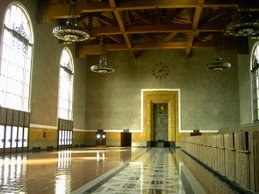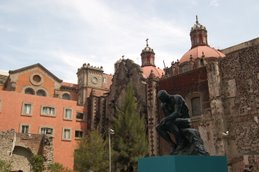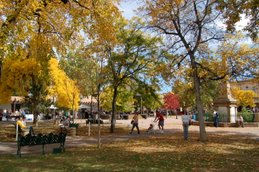Venice, The Bigger They Are, The Harder They Fall
It's no secret that Venice has had some of the greatest appreciation of any area on the Westside. But now that we are on the downside, how will it fair? IMHO, I believe it will suffer one of the worst price declines, once we reach bottom of this real estate cycle. My reasoning has to do with intrinsic "Value" as opposed to perceived "Price". Now that the era of easy credit has come to an end, the prices that will be financed will be based on fundamental value as opposed to the highest bidder. This adjustment has already started with the area having dropped in price by 15-20% over the last 2 years. According to Dr. Housing Bubble's "The Elusive California Housing Bottom", if history repeats itself, this should continue until we bottom out around 2012 - 2013. Although first to the party and last to leave, Venice will suffer more than the others. Here is why:
1) Small lots
2) Limited if any parking
3) Decreased Los Angeles City Services
4) Increased Crime due to faltering economy
5) Exceedingly difficult financing on overpriced homes
To get a picture of this in the future, lets look at a home that recently sold in May of 2009. I am particularly choosing a home that I believe is an original condition without significant improvements, in order to look at land values for comparison.
931 Nowita Place, Venice CA 90291
2+1, 816 sqft, Lot Size 3400 sqft
Built in 1923
SOLD on 5/14/2009 for $675,000
We will look at the current price today, as opposed to the peak price in 2007, which was probably closer to $800,000+. Since this house is probably a fixer/teardown, we can figure it is very close to land value only. Looking at land values that equates to about $200/sqft of land at today's price ($675,000). During the last real estate boom in 1987-1990, this house was "valued" about $170,000 at the beginning of 1987 or $50/sqft of land. If history repeats itself we will untimately revert back to the norm where homes usually appreciate about 2.5 - 3% a year or at the rate of average inflation. According to history, the "value" of this house is really around $275,000, or 60% less than it's current "price" . If we look at the drop from peak "pricing" in 2007 to the eventual bottom around 2012-2013 it is 66%. This coincides with the Case/Shiller Index that shows the market peaking around 300 in 2007 from a baseline of 100 as the historical mean.
Now some will untimately say that Venice is a "niche" market that is full of Hollywood Entertainers or people flush with cash. Generally people that fit this profile are flush with cash for a reason or have a manager that helps them with their finances. They will be the first to head for the exits, once the final stages of denial are left in the dust.




























17 comments:
latesummer2009, you have a great blog, but to make things more interesting and fun, I recommend seeking out some finance guys who read this blog to make a fake market for options on when and how much prices will fall. This will make things very interesting and force people to think more clearly about prices and real estate.
709 Palms in Venice
http://www.zillow.com/homedetails/charts/20451950_zpid,5years_chartDuration/
I know the guy who bought this home & sold it, nice $1M profit. Funny how it's gone down from $1.7M to $1.2M. What's it like to sit on an egg, sucka?
Venice has further to fall.
I agree with the basic analysis, but wonder how the effects of gentrification should be accounted for. In 1987 you couldn't park your car on Rose Ave overnight with out getting your window smashed and there was much more gang activity. Today there is a brand new Whole Foods on Rose Ave. I assume WF did some research on the demographics and determined a shift had occurred. That doesn't erase your analytical 66% decline, but should temper it. Unchanged are the bad LA City services (more crime, bad schools) and small lots.
"...but wonder how the effects of gentrification should be accounted for...."
Although i 100% agree with your comment, marginal areas will commonly go through a 'reverse-gentrification" as well. Its usually not as severe on the reverse, but it does happen.
RE: 5:11AM. Funny that broken auto glass was mentioned.
Don't know if it's the economy, homeless handouts, or gang activity, but a few weeks back I mentioned the greater amount of broken auto glass along Main (South of Rose) and the general surrounding area. (Every Sunday for last four years I've riden my bike from West LA to Redondo; believe me, there is a difference)
On the other hand, perhaps it's just the reduced city services (CA budget(?))in cleaning up what naturally occurs each week.
Either way, neither is a good sign.
Jason
intrinsic "Value" as opposed to perceived "Price".
You are abusing the terms "price" and "value." The "Price" is whatever denomination someone offers something for sale. (dollars for practically every transactions in the U.S.)
The "value" is some combination of perception/reality in the buyer's AND seller's mind.
When the buyer/seller agree upon a price, the general notion is that both buyer and seller are getting more than what they each want out of the deal.
In an academically free market, boom-bust price swings can be much wider. But we all know the U.S. is attempting to keep asset valuations inflated at all possible cost.
I wish I had the link for you, but there's a very insightful article on a public mortage-holding company whose recent financial performance was picked apart. Bottom line as it relates to your blog, I would add 2-5 years to your estimates.
In plain English, what I got out of it was that no one in the home loan value chain wants to admit/write off non-performing assets.
For now, mortgage-related companies are pretending it will get better and doing everything they can to maintain that appearance. No doubt there is more surprises/collapses to come in the mortgage value chain.
IMHO, home prices will be very sticky going forward with even more hidden buyer/seller costs in valuation. Such that the decline much more slowly for a much longer time with a net decline nowhere near case/shiller bottom of the boom-bust-curve pricing.
Did they "gentrify" the Oakwood housing project in Venice? Reduced the number of drug dealers, users, hookers and bums? Fixed the narrow, barely paved residential streets? Clean out the stagnant canals?
No? then - other than the beach - what's the excuse for the high prices (even by West LA standards) for crappy houses on tiny lots? If it's the "Entertainment Business" types, they're not know for their high IQs...
People come to Venice because they love the counter-culture. I'm one of them. That said, i'm exhausted from being awakened by a helicopter circling my house at 4:00 am. I'll continue to rent because prices simply don't make sense. None of our friends who bought here 6 years ago could afford to buy now....AND, what they didn't realize when they bought homes before they had kids is that you can't send your kids to public school in Venice! Add $15,000/year on to your mortgage to shelp your kids to a school across town. It's just crazy. And ask anyone about police response times to our recent crime wave (home burglaries)...25 min, 40 min...That's no exaggeration. Prices just have to come down. Even for beach properties.
If you are gonna buy in the beach cities, buy in Santa Monica....city services and schools are good and the south SM neighborhoods are comparable in price and age of homes to Venice.....why would someone choose Venice over SM, I am curious????
Interesting blog. Why do you use different colors for no apparent reason. Gives me a headache and it looks unprofessional. Back on topic, I agree with you that Santa Monica has much further to decline. Another 30-50% by 2013 wouldn't surprise me.
LA is over-rated. The only reason I live her is because my wife likes it here. ur..... for what we pay in rent, we can buy a 1.5mm equivalent home in most parts of the country. Why do ppl like west LA so much. Feel so freaking "homeless" living out here, and I make 250k/year. Prices are so out of whack for what you get out here.
i grew up in a part of Culver City that received LA services (power, water, schools). We moved several times, all within a 10 block radius (90066 too). I hated that neighborhood. I cannot believe that all these white people are racing to buy in the same blocks that the Phillipinos hated the Chicanos, and the Mexicans were mostly illegal (the Gardens). The families in that area are piss poor but the Flips buy mercedes and bemws and the beaners buy trucks.
Anon 6:30AM: One word: Gentrification
GUys- what gives?!>? I mean, c'mon:
RES-SFR: 4148 MENTONE AVE , CULVER CITY 90232 MLS#: 09-386357 LP: $679,000
RES-SFR: 11349 NINA PL , CULVER CITY 90230 MLS#: 09-386473 LP: $510,000
WTF??!!
Just on the MLS? These prices are HIGH!!! The Mentone place is a small house in an OK neighborhood and the Nina is a rat trap by the 405!
WTF?! Where are the price drops?Q
Signed,
Confused about market predictions..
The results are in from our reader poll:
Bottom Price for a Venice Starter Home will be
$200-$299K (30%)
$300-$399K (27%)
$400-$499K (27%)
$500-$699K (16%)
84% believe Venice Starters will drop at least $150K, if not more. With 20% down, there goes your down payment and possible much more.
I sure hope you love the house and location, because you could be there a long time.
i agree that prices are dropping in venice about 10-20% off ridiculously high 2007 prices, but 931 nowita is an OUTLIER and an inside deal, NO OTHER west of lincoln lot on a good street (no oakwood) that's 3400 sq ft has sold for less than 800-850k
Interesting that you note intrinsic or fundamental value. I noticed that you used to be an appraiser and wonder what you would think of the idea of appraisers incorporating this into their analysis somehow. Appraisers simply spitting out market value (usually as directed by a mortgage broker) has accomplished less than zero over the last decade. It seems appraisers were in a position to mitigate this disaster. I came across this article written more than a year and a half ago:
http://www.entrepreneur.com/tradejournals/article/176131511.html
This guy called it rental replacement value, not fundamental value but I think the overall principle is the same. Seems the Appraisal Institute crapped all over him if you read the followup. Seems this kind of analysis would have been helpful in the context of an appraisal report, what do you think?-
Post a Comment